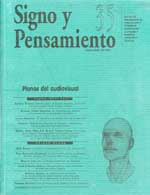Abstract
El artículo intenta construir un perfil histórico y formal del documentalismo realizado por latinos en los Estados Unidos. El autor construye una historia de esta producción documental en el contexto de la historia de los chicanos y latinos en ese país. Según el autor, los documentales latinos a partir de 1990 tienden más a imaginar a los latinos en los Estados Unidos como una comunidad de intereses comunes e historias similares. Otro cambio en la auto-representación de latinos en el documental es la importancia que se le da al individuo. Un tercer elemento analizado es el efecto en el imaginario cultural y político del latino de la creación de cadena de televisión de habla hispana como Telemundo y Univisión. "Podríamos considerar los noticieros de las cinco de la tarde como una especie de documental que ha ayudado a crear una conciencia pan-latina y hasta panamericana dentro de las comunidades latinas en los Estados Unidos". El autor construye una breve historia de estas cadenas. Se realiza un juicio crítico acerca de tres videos documentales: Latino Images, Brincando el charco: Portrait of a Puerto Rican y The Transformation.This journal is registered under a Creative Commons Attribution 4.0 International Public License. Thus, this work may be reproduced, distributed, and publicly shared in digital format, as long as the names of the authors and Pontificia Universidad Javeriana are acknowledged. Others are allowed to quote, adapt, transform, auto-archive, republish, and create based on this material, for any purpose (even commercial ones), provided the authorship is duly acknowledged, a link to the original work is provided, and it is specified if changes have been made. Pontificia Universidad Javeriana does not hold the rights of published works and the authors are solely responsible for the contents of their works; they keep the moral, intellectual, privacy, and publicity rights.
Approving the intervention of the work (review, copy-editing, translation, layout) and the following outreach, are granted through an use license and not through an assignment of rights. This means the journal and Pontificia Universidad Javeriana cannot be held responsible for any ethical malpractice by the authors. As a consequence of the protection granted by the use license, the journal is not required to publish recantations or modify information already published, unless the errata stems from the editorial management process. Publishing contents in this journal does not generate royalties for contributors.


